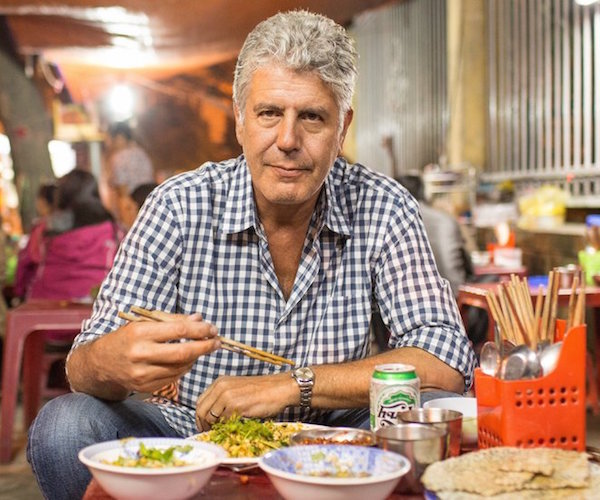WATCH CLOSELY: Anthony Bourdain — An Exhaustive Passion
In contrast to the contrived food shows of today, Anthony Bourdain brought class and vigor as well as creativity to his fascinating stories of food and travel.

The late Anthony Bourdain in Vietnam. Photo: Fair.org.
By Peg Aloi
When Anthony Bourdain burst on the scene at the start of the new millennium with his book Kitchen Confidential: Adventures in the Culinary Underbelly, it was like someone turned the light on, illuminating dark corners of the restaurant industry that most diners had never thought about. An essay Bourdain impulsively sent to the New Yorker entitled “Don’t Eat Before Reading This” landed him a book deal. I first learned of what was to become a best-selling expose while watching Bourdain in a fascinating segment for 60 Minutes that showed him working in the kitchen at Brasserie Les Halles, his popular New York restaurant. His wiry frame, frenetic energy, and sardonic humor — accented by chain-smoking and profanity — somehow reflected the simplicity and high quality of the restaurant’s signature dish: steak frites (various cuts of steak were available) served with a simple salad of mesclun greens. This rustic, bistro-style fare became the new norm for urban cuisine.
In between shots of Bourdain bustling in the kitchen, the segment payed close attention to the shocking revelations in his book, disclosures of what he insisted was common practice in many restaurants. Among other horror stories: serving less than fresh fare from leftover ingredients (never order the fish stew, people) and picking up food that had fallen on the floor and barely brushing it off before serving it to diners. That Bourdain was a savvy chef, an obvious gourmand (if an untrained one), a funny and engaging writer, all paled beside the bombshell that he was a recovering heroin addict. His struggle to stay off drugs was a dark backdrop to the book’s drama — it was intimately connected to his exhaustive passion in the kitchen.
Bourdain’s infectious personality proved to be charismatic. The rest, as they say, is history. He went on to pen several more books (including a sequel to Kitchen Confidential entitled Medium Raw: A Bloody Valentine to the World of Food and the People Who Cook, a reference to Bourdain’s disdain for people who like their meat overcooked). He landed his own television show on the Food Network in 2002, A Cook’s Tour. After two seasons Bourdain produced and hosted his popular series No Reservations, which ran for seven seasons on the Travel Channel. Later there was a short-lived travel and food show called The Layover, and, after a dispute over copyright that led him to leave the network, came his final show Anthony Bourdain: Parts Unknown on CNN. This last title was eerily prescient, given the shock that greeted news of Bourdain’s death by suicide in France this past week.
Bourdain’s television career was all about him doing what he clearly loved, something that he thought was vital to being a human being — illuminating the global food chain. Sharing local foods with others was the meat and potatoes of his show, including interacting with the people who grew produce, who raised livestock or worked as fishermen, who sourced ingredients, who prepared food, and who sold food to customers. His disdain for the snobbery and hierarchy of the restaurant industry was a constant theme: he consistently revealed and expounded upon the inequity of the food industry worldwide. No subject was too taboo, including the employment of undocumented workers or pointing out the centrality of their importance to the American food industry. Bourdain was daring, to the point of being almost comically curious about unfamiliar cuisine. He would gamely devour food that to many of us would be horrific, including live insects, rotten eggs, or fetid dishes that had been aged underground.
I’m not a huge fan of reality TV, and cooking shows in recent years have become especially irritating. I grew up in the era of Graham Kerr, the Galloping Gourmet, and Julia Child, the French Chef. The narcissistic antics of people like the Food Network’s Guy Fieri are super annoying and while Ina Garten’s approach to food dovetails with my own, her perfect kitchen and artificially arranged dinner dates have always felt pretentious to me. Yes, The Great British Bake-Off was a game changer but, as often happens, hordes of American fans have changed the look and feel of an authentic TV property.
In contrast to the contrived food shows of today, Anthony Bourdain brought class and vigor as well as creativity to his fascinating stories of food and travel. He approached television as he did the art of cooking: shambling, risqué, shocking, passionate, and somewhat righteous. Part travelogue, part sociopolitical manifesto, and part exploration of the simple cuisines of the world, Bourdain’s approach to the documentary form was consistently egalitarian: his compassion for outsiders and for the poor, exploited, or unjustly treated was palpable with every visit he embarked on and every dish he discovered, prepared, or shared. Along with sadness and anger at his loss there should be deep gratitude. Bourdain underscored an important truth: what and how we eat reflects what and who we are.
Peg Aloi is a former film critic for The Boston Phoenix. She taught film and TV studies for ten years at Emerson College, and currently teaches at SUNY New Paltz. Her reviews also appear regularly online for The Orlando Weekly, Cinemazine, and Diabolique. Her long-running media blog “The Witching Hour” can be found at themediawitch.com
